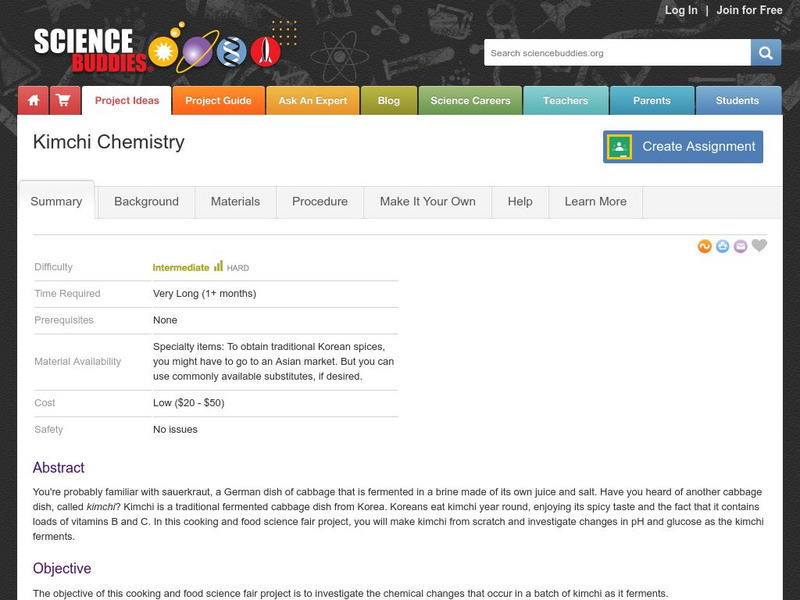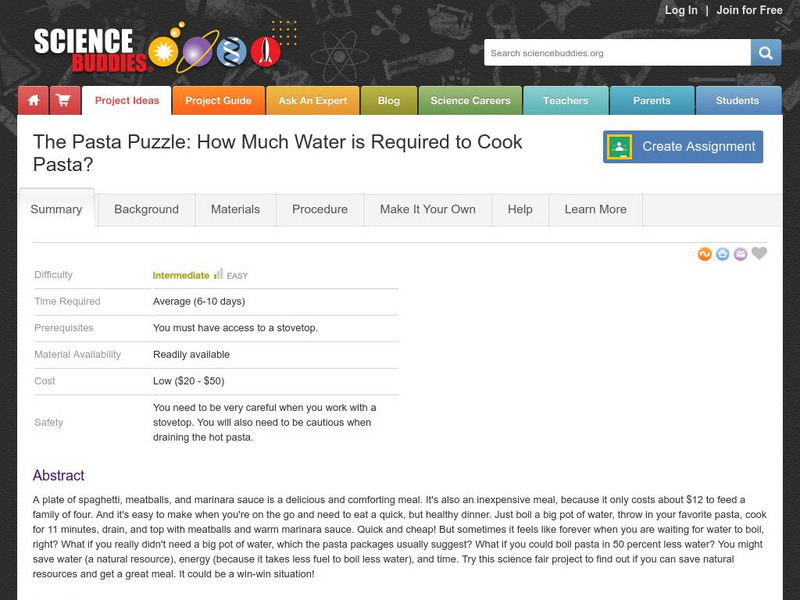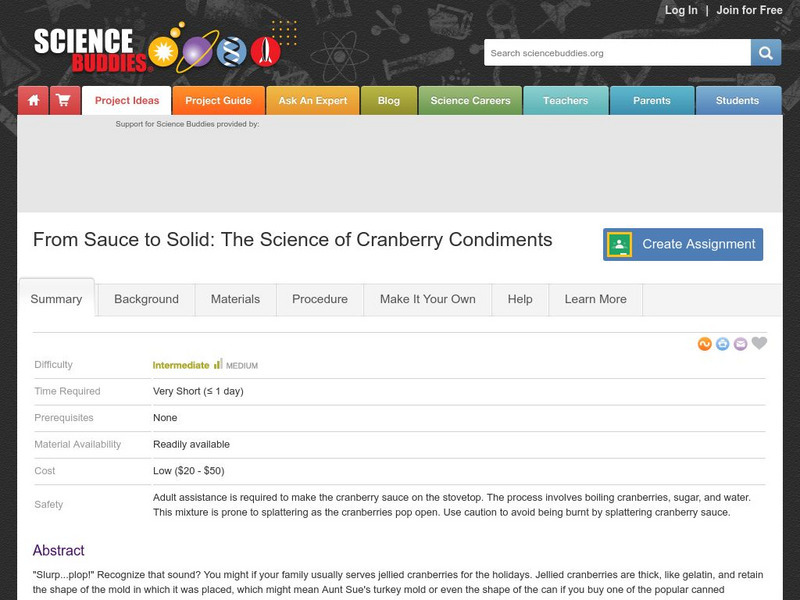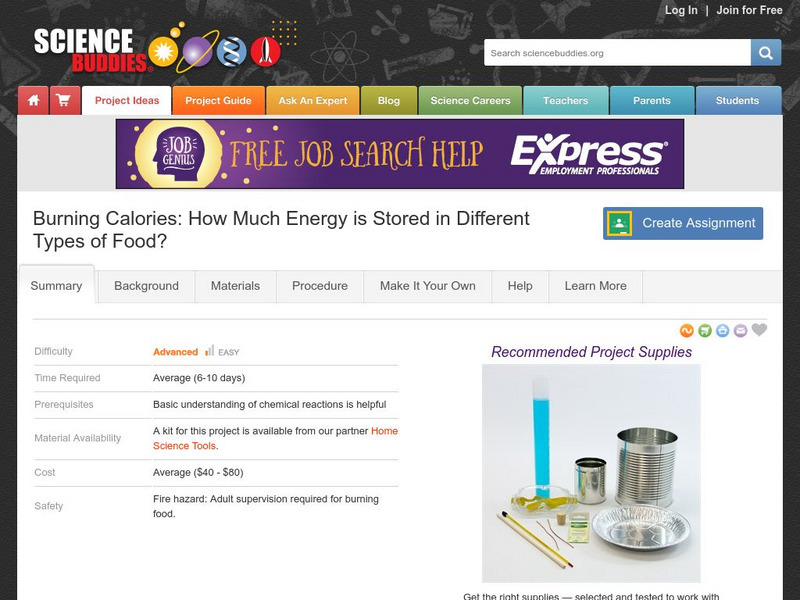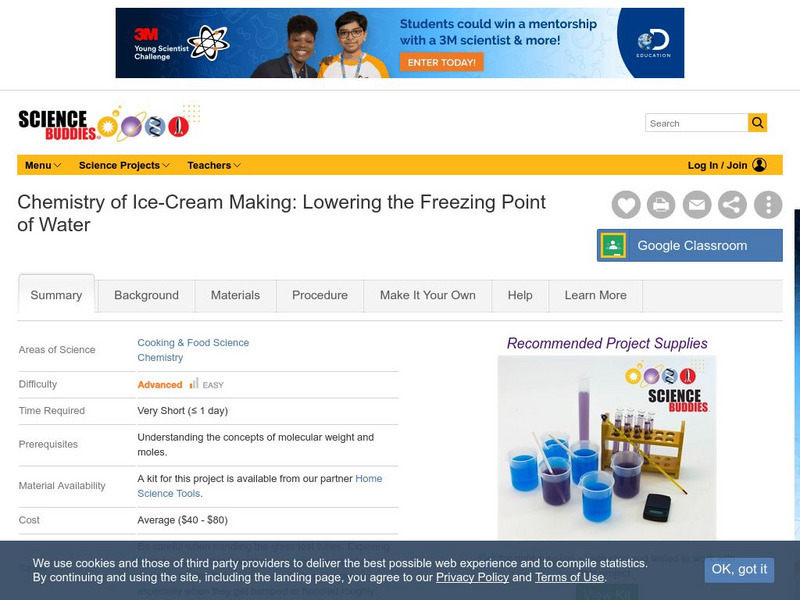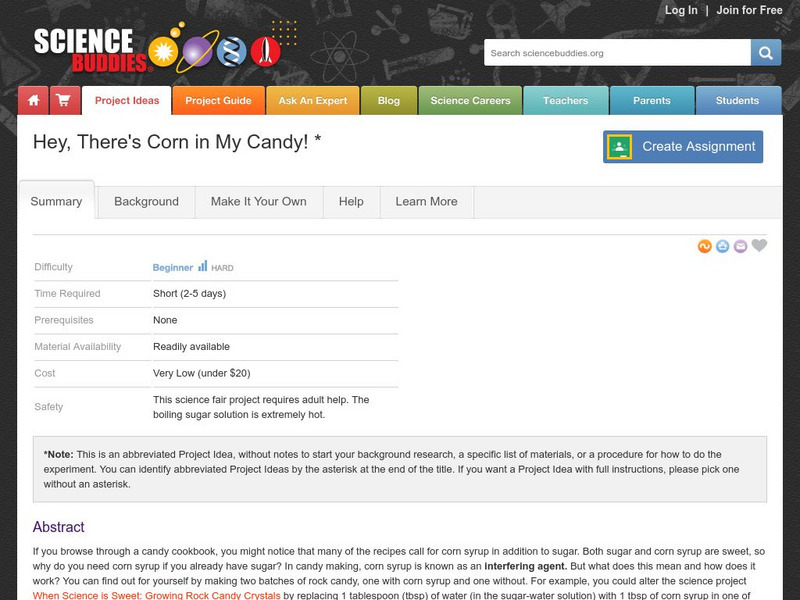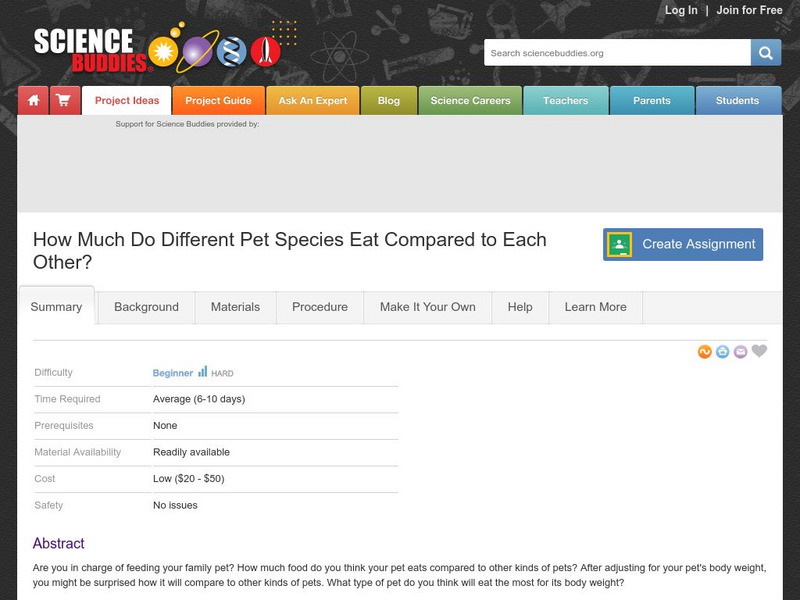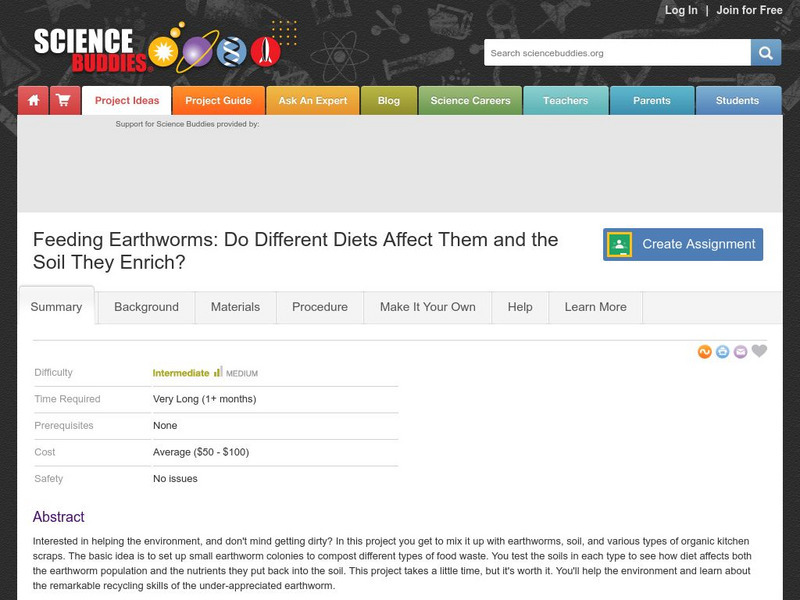Hi, what do you want to do?
Science Buddies
Science Buddies: Project Ideas: Hidden Grasses and Beans in Processed Foods
In this cooking and food science fair project, determine which common crops are found most often in processed foods. The Science Buddies project ideas are set up consistently beginning with an abstract, objective, and introduction,...
Science Buddies
Science Buddies: Project Ideas: Understanding How Food Becomes Rancid
In this cooking and food science fair project, the student will determine how light and air can oxidize fat in potato chips and cause the chips to go rancid. The Science Buddies project ideas are set up consistently beginning with an...
Science Buddies
Science Buddies: Project Ideas: What Makes Foams Stand Up Straight
In this food science fair project, students will determine which foods make good edible foams, with high volume and longevity. The Science Buddies project ideas are set up consistently beginning with an abstract, objective, and...
Science Buddies
Science Buddies: Project Ideas: Perfecting Pastries: Role of Fats
In this cooking and food science fair project the student will investigate the effect that fat and its temperature have on the taste and texture of pastry shells. The Science Buddies project ideas are set up consistently beginning with...
Science Buddies
Science Buddies: Project Ideas: How Much Water Is Absorbed by Dried Beans?
In this cooking and food science fair project, measure how the water content of dried beans changes with time. The Science Buddies project ideas are set up consistently beginning with an abstract, objective, and introduction, followed by...
Science Buddies
Science Buddies: Project Ideas: Save Those Spoiling Strawberries!
In this food science fair project, the student will determine if thermotherapy can inhibit strawberries from becoming moldy and decaying. The Science Buddies project ideas are set up consistently beginning with an abstract, objective,...
Science Buddies
Science Buddies: Project Ideas: Kimchi Chemistry
In this cooking and food science fair project, the student will make a batch of kimchi, the national dish of Korea, and investigate the changes in pH and glucose concentration as it ferments. The Science Buddies project ideas are set up...
Science Buddies
Science Buddies: Project Ideas: How Much Water Is Required to Cook Pasta?
In this cooking and food science fair project, determine if you really need 6 quarts of water to cook a pound of pasta. The Science Buddies project ideas are set up consistently beginning with an abstract, objective, and introduction,...
Science Buddies
Science Buddies: Project Ideas: Sauce to Solid: Science of Cranberry Condiments
Determine how the cooking time of cranberry sauce affects its ability to form a pectin-supported solid. The Science Buddies project ideas are set up consistently beginning with an abstract, objective, and introduction, followed by a...
Science Buddies
Science Buddies: How Much Energy Is Stored in Different Types of Food?
In this project you'll learn a method for measuring how much chemical energy is available in different types of food. You will build your own calorimeter to capture the energy released by burning a small food item, like a nut or a piece...
Science Buddies
Science Buddies: How Do You Make the 'Best' Cookie?
The benefit to cooking food from scratch versus store bought food is that you determine the taste. In this science fair project, discover if you can perfect the taste of your favorite cookie right in your own kitchen by experimenting...
Science Buddies
Science Buddies: Lowering the Freezing Point of Water
When it comes to making ice cream, in order to make the mixture cold enough to freeze, you surround the container with ice and rock salt. This experiment helps you learn how the addition of salt (or other substances) affects the freezing...
Science Buddies
Science Buddies: Project Ideas: Processed Cheese
The goal of this cooking and food science fair project is to understand how processed cheese is made, and to determine which percentage of emulsifying salt produces the best processed cheese. The Science Buddies project ideas are set up...
Other
British Nutrition Foundation: Food a Fact of Life (11 14 Years)
A rich collection of eleven learning modules that cover a wide range of topics, including nutrition, diet and health, food science, agriculture, food preparation, food processing, food safety, and more. Modules have PowerPoints,...
Science Buddies
Science Buddies: Project Ideas: How Much Sugar Is Really in That Soda?
In this science fair project, use a precision hydrometer to measure the amount of sugar in soda. The Science Buddies project ideas are set up consistently beginning with an abstract, objective, and introduction, followed by a section on...
Science Buddies
Science Buddies: Project Ideas: Simple Device to Measure the Strength of Tea
In this science fair project, measure the strength of tea, using plastic cups, a photoresistor, and a multimeter. The Science Buddies project ideas are set up consistently beginning with an abstract, objective, and introduction, followed...
Science Buddies
Science Buddies: Project Ideas: Bitter to Sweet: Sugar Changes in Ripening Fruit
In this science fair project, use a refractometer to measure changes in sugar content in ripening fruit. The Science Buddies project ideas are set up consistently beginning with an abstract, objective, and introduction, followed by a...
Science Buddies
Science Buddies: Hey, There's Corn in My Candy!
In candy making, corn syrup is known as an "interfering agent." You can find out just what this agent does by making two batches of lollipops, one with corn syrup and one without and examining the differences between the two. Once you...
Science Buddies
Science Buddies: When Science Is Sweet: Growing Rock Candy Crystals
Though rock candy seems to be a simple enough treat, it is also pretty interesting to make. Crystallized sugar that can be grown from a sugar-water solution is just how rock candy is made. In this experiment, you will learn to make your...
Science Buddies
Science Buddies: Mag Nificent Breakfast Cereal
You will devise a way of testing foods for supplemental iron additives in this experiment provided by Science Buddies. Then you will use your design to test different breakfast cereals to see how much iron they contain. The goal is to...
Science Buddies
Science Buddies: How Much Do Different Pet Species Eat?
How much food do you think your pet eats compared to other kinds of pets? In this experiment you will compare the food intake of your family pets to find out which pet eats more for its body weight.
Science Buddies
Science Buddies: Primary Productivity and Plankton
The oceans contain both the earth's largest and smallest organisms. Interestingly they share a delicate relationship linked together by what they eat. The largest of the ocean's inhabitants, the Blue Whale, eats very small plankton,...
Science Buddies
Science Buddies: How Does Packaging Affect the Ripening of Fruit?
Why do different types of fruits come packaged in different ways? In this project, you will experiment with different ways of packaging fruit to see if it has an effect on the freshness of the fruit. Will a different kind of packaging...
Science Buddies
Science Buddies: How Diets Affect Earthworms and the Soil They Enrich
In this environment-oriented experiment, you will mix it up with earthworms, soil, and various types of organic kitchen scraps. The basic idea is to set up small earthworm colonies to compost different types of food waste. You test the...











